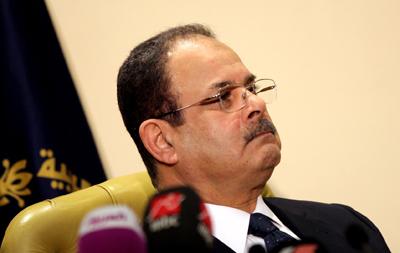You are here
Egypt’s security chief warns of scheme to incite chaos
By AP - Oct 24,2016 - Last updated at Oct 24,2016

In this March 6, 2016 file photo, Egyptian Interior Minister Magdy Abdel-Ghaffar gives a live appearance on state and private television in Cairo, Egypt (AP photo)
CAIRO — Egypt’s interior minister warned in comments published on Monday that the country faced “unprecedented challenges” that required a “decisive” response by security forces, accusing the now-banned Muslim Brotherhood of scheming to incite chaos.
The minister’s comments, which came in an interior ministry statement published in state-owned newspapers, was the latest sign of alarm by President Abdel Fattah Al Sisi’s government over possible unrest as result of worsening economic conditions.
In Monday’s statement, Interior Minister Magdy Abdel-Ghaffar, who is in charge of the police, said the Brotherhood was seeking through “conspiratorial schemes to incite chaos and confusion with the aim of creating skepticism over the ability of the state and its institutions to satisfy popular expectations”.
“The security forces will not, under any circumstances, tolerate any attempt to repeat the scenes of chaos and sabotage at a time when the country is moving forward with firm steps toward a promising future, God willing,” said the minister.
Abdel-Ghaffar did not elaborate, but appeared to be alluding to the 2011 popular uprising that toppled longtime ruler Hosni Mubarak. Egypt’s police force largely melted away on the fourth day of the 18-day uprising, when police stations were stormed and thousands of inmates broke out from a number of prisons.
His comments, however, are the latest warning by officials and pro-government media against what they say are calls by the Brotherhood for street demonstrations on November 11 to protest against prices rises and other economic woes.
There has been no reliable evidence that the Brotherhood was specifically behind the call for protests next month, although the group has consistently encouraged anti-government protests by its supporters since senior Brotherhood official Mohammed Morsi, Egypt’s first freely elected but divisive president, was ousted in July 2013, by the military, then led by Sisi.
In an October 14 statement posted on its website, the Brotherhood urges Egyptians to rise up and topple Al Sisi’s government, but gives no specific date for the demonstrations it is calling for.
Al Sisi appeared to refer to these planned protests when, in a meeting with government leaders on Saturday, he urged authorities to be on high alert and beef up the defence of vital state installations. The meeting came just hours after a senior Egyptian army officer was gunned down outside his home in an eastern Cairo suburb.
A little-known group with suspected links to the Brotherhood claimed responsibility for the brazen daylight attack.
Sisi’s government has already shown sensitivity to signs of a popular backlash over the economy. The presidency has issued near-daily statements saying Al Sisi is instructing ministers to ensure the availability of basic staples at affordable prices and to prosecute any merchants found to be hoarding food supplies.
Despite the economic crisis, Al Sisi appears to enjoy considerable public backing, though it has shown some erosion since 2014 when he was hailed as a national savior. The Egypt-based polling agency Baseera, one of the few that conducts polls in the country, said its latest survey this month showed 68 per cent of respondents approve of his performance, down from 79 per cent in April and 85 per cent in November. The poll surveyed 1,520 people above the age of 18 with a margin of error of 3 per cent.
The perceived fears of a popular backlash over the economy come as shortages and rising food prices are feeding discontent among Egyptians, who are also enduring new taxes and a hike in utility bills. The government must also introduce a package of economic reforms, including the devaluation of the pound and lifting fuel subsidies, to secure a $12-billion dollar loan from the International Monetary Fund to bail out Egypt’s ailing economy.
Egypt is suffering an acute foreign currency shortage because of the decimation of its lucrative tourism industry, a fall in Suez Canal revenues and reduced remittances from Egyptian expatriates. It also suffers from double digit rates of inflation and unemployment.
Its economic crisis comes as Egypt’s security forces are battling an Islamic militant insurgency in the Sinai Peninsula.
Related Articles
Just over half Egyptians approve of former army chief Abdel Fattah Al Sisi, an opinion poll showed on Thursday, just days ahead of a presidential election he is expected to win easily.
Grilled meat vendor Tarek Fathi planned to support Abdel Fattah Al Sisi in Egypt’s presidential election, believing the man worshiped in the press could fix all problems: from shabby healthcare to an energy crisis.
CAIRO — Some of the people who helped propel Egypt's President Abdel Fattah Al Sisi to power are calling for his replacement in an election















